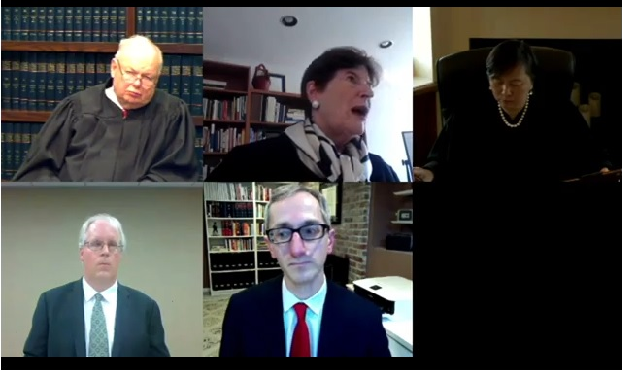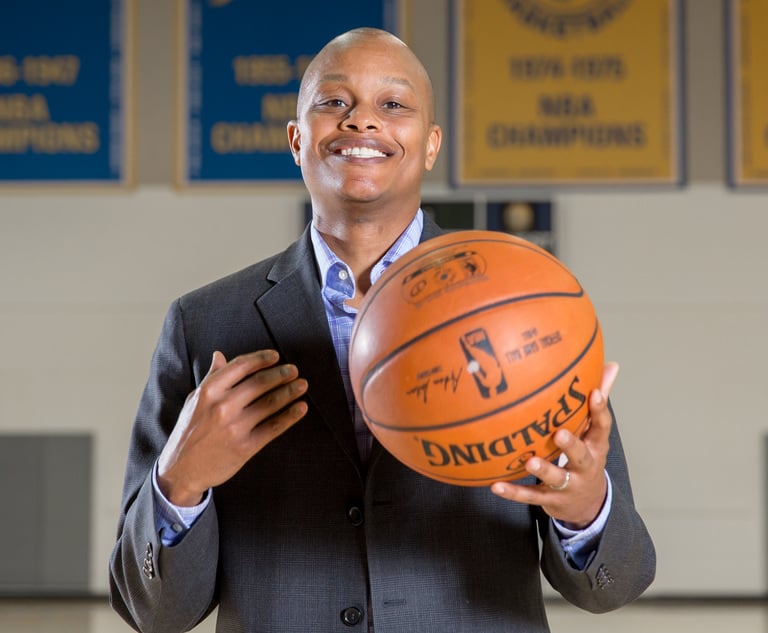9th Circuit Throws Cold Water on 'Mash-Up' Theory of Fair Use
A "Star Trek"-themed version of a Dr. Seuss classic doesn't sound transformational, Judge M. Margaret McKeown suggested in a case that's drawn intense amicus interest.
April 27, 2020 at 08:42 PM
5 minute read
 The U.S. Court of Appeals for the Ninth Circuit hear arguments April 27 in "Dr. Seuss Enterprises v. ComicMix." Clockwise, from top left: Judges N. Randy Smith, M. Margaret McKeown and Jacqueline Nguyen and attorneys Dan Booth and Stanley Panikowski.
The U.S. Court of Appeals for the Ninth Circuit hear arguments April 27 in "Dr. Seuss Enterprises v. ComicMix." Clockwise, from top left: Judges N. Randy Smith, M. Margaret McKeown and Jacqueline Nguyen and attorneys Dan Booth and Stanley Panikowski.
It sounds as if the authors of a Dr. Seuss-"Star Trek" mashup will have to boldly go to trial on copyright infringement—without their fair use defense.
Argued before the U.S. Court of Appeals for the Ninth Circuit Monday, Dr. Seuss Enterprises v. ComicMix was framed by some amici curiae as a prime opportunity to apply fair use principles to the increasingly popular art of mash-ups. But the arguments ended up turning more on traditional principles of fair use, and not in a way that favored the authors of "Oh, the Places You'll Boldly Go," a book that places "Star Trek" characters and props in Dr. Seuss settings.
Hedging his bets, attorney Dan Booth of Dan Booth Law argued that "Boldly Go" is both a parody of "Oh, the Places You'll Go" and a mash-up. "It's both at once. That is an innovative form that combines elements from two different sources and puts them in dialogue with one another," he told the judges. "The test should be the same for a parody."
"That seems to me to be somewhat an after-the-fact justification of why they chose Dr. Seuss," Judge M. Margaret McKeown told Booth. "If you go back in the record, and the creators of 'Boldly' are looking around for what should they use, and how should they copy it, slavishly, and that sort of thing," she said. Eventually they hit on "Oh, the Places You'll Go."
Dr. Seuss Enterprises, or DSE, is represented by DLA Piper. It contends that science fiction author David Gerrold, illustrator Ty Templeton and ComicMix founder Glenn Hauman picked "Oh, the Places You'll Go" because they believed a "Star Trek" version would make a great holiday or graduation gift, exactly the market the Dr. Seuss book plays to.
DSE has licensed other authors to create "Oh, The Things You Can Do That Are Good For You" and "Oh, the Places I've Been! Journal." But the ComicMix authors plunged ahead unlicensed, even though they acknowledged in their Kickstarter campaign that "we may have to spend time and money proving [fair use] to people in black robes."
"'Boldly' is just a 'Star Trek'-flavored clone" of "Oh, the Places You'll Go," DLA partner Stanley Panikowski told the Ninth Circuit on Monday.
The authors argued, and U.S. District Judge Janis Sammartino of San Diego had agreed, that while they borrowed liberally from the Seuss book, they rewrote all of the text and reframed the images from a unique "Star Trek" viewpoint. ("You can get out of trouble, any that's knotty/because in a pinch you'll be beamed out by Scotty," the book reads at one point.)
Booth tried to pick up where Sammartino had left off. "The book is constantly pointing out the individualist and narcissistic character of 'Oh, the Places You'll Go,'" he told the Ninth Circuit. "The Star Trek Enterprise, and the Star Trek crew, is a team effort. … Group support and communion rather than individuality."
McKeown said she didn't see how that amounts to parody. Plus, she pointed out, "when they said parody, they also said, 'Well, maybe those people in black robes would disagree with us.'"
"That's true," Booth acknowledged. "They were quite tongue-in-cheek about that. But they made it very clear that their opinion was this was fair use, this was a parody, this is a transformative work."
McKeown also sounded skeptical of the mash-up argument. "The district court seemed to take the position that if you take existing expression and intersperse it with some new expression, then all of a sudden you have a transformative work," McKeown said. "That is a definition of transformative and fair use that I certainly haven't seen before."
Booth insisted that "if you are using underlying materials, and using them in a different way every time as thoroughly as the defendants did," then you have transformed it.
Booth appeared to make some modest headway with McKeown, who told him she'd let him exceed his allotted time "because you've been making some very interesting arguments."
It sounded as if the case would come down to whether the ComicMix authors failed to prove their book wouldn't harm the market for "Oh, the Places You'll Go." Panikowski argued—and the Ninth Circuit judges seemed to agree—that Sammartino had erred in placing the burden of proof on DSE, because the burden of proving fair use always falls on the defendant.
This content has been archived. It is available through our partners, LexisNexis® and Bloomberg Law.
To view this content, please continue to their sites.
Not a Lexis Subscriber?
Subscribe Now
Not a Bloomberg Law Subscriber?
Subscribe Now
NOT FOR REPRINT
© 2025 ALM Global, LLC, All Rights Reserved. Request academic re-use from www.copyright.com. All other uses, submit a request to [email protected]. For more information visit Asset & Logo Licensing.
You Might Like
View All
NBA Players Association Finds Its New GC in Warriors Front Office

Eagles or Chiefs? At These Law Firms, Super Bowl Sunday Gets Complicated
3 minute read
Blake Lively Is Sued by Texas Crisis Specialist in Latest 'It Ends With Us' Lawsuit
4 minute read
Chicago Law Requiring Women, Minority Ownership Stake in Casinos Is Unconstitutional, New Suit Claims
5 minute readLaw Firms Mentioned
Trending Stories
- 1ACC CLO Survey Waves Warning Flags for Boards
- 2States Accuse Trump of Thwarting Court's Funding Restoration Order
- 3Microsoft Becomes Latest Tech Company to Face Claims of Stealing Marketing Commissions From Influencers
- 4Coral Gables Attorney Busted for Stalking Lawyer
- 5Trump's DOJ Delays Releasing Jan. 6 FBI Agents List Under Consent Order
Who Got The Work
J. Brugh Lower of Gibbons has entered an appearance for industrial equipment supplier Devco Corporation in a pending trademark infringement lawsuit. The suit, accusing the defendant of selling knock-off Graco products, was filed Dec. 18 in New Jersey District Court by Rivkin Radler on behalf of Graco Inc. and Graco Minnesota. The case, assigned to U.S. District Judge Zahid N. Quraishi, is 3:24-cv-11294, Graco Inc. et al v. Devco Corporation.
Who Got The Work
Rebecca Maller-Stein and Kent A. Yalowitz of Arnold & Porter Kaye Scholer have entered their appearances for Hanaco Venture Capital and its executives, Lior Prosor and David Frankel, in a pending securities lawsuit. The action, filed on Dec. 24 in New York Southern District Court by Zell, Aron & Co. on behalf of Goldeneye Advisors, accuses the defendants of negligently and fraudulently managing the plaintiff's $1 million investment. The case, assigned to U.S. District Judge Vernon S. Broderick, is 1:24-cv-09918, Goldeneye Advisors, LLC v. Hanaco Venture Capital, Ltd. et al.
Who Got The Work
Attorneys from A&O Shearman has stepped in as defense counsel for Toronto-Dominion Bank and other defendants in a pending securities class action. The suit, filed Dec. 11 in New York Southern District Court by Bleichmar Fonti & Auld, accuses the defendants of concealing the bank's 'pervasive' deficiencies in regards to its compliance with the Bank Secrecy Act and the quality of its anti-money laundering controls. The case, assigned to U.S. District Judge Arun Subramanian, is 1:24-cv-09445, Gonzalez v. The Toronto-Dominion Bank et al.
Who Got The Work
Crown Castle International, a Pennsylvania company providing shared communications infrastructure, has turned to Luke D. Wolf of Gordon Rees Scully Mansukhani to fend off a pending breach-of-contract lawsuit. The court action, filed Nov. 25 in Michigan Eastern District Court by Hooper Hathaway PC on behalf of The Town Residences LLC, accuses Crown Castle of failing to transfer approximately $30,000 in utility payments from T-Mobile in breach of a roof-top lease and assignment agreement. The case, assigned to U.S. District Judge Susan K. Declercq, is 2:24-cv-13131, The Town Residences LLC v. T-Mobile US, Inc. et al.
Who Got The Work
Wilfred P. Coronato and Daniel M. Schwartz of McCarter & English have stepped in as defense counsel to Electrolux Home Products Inc. in a pending product liability lawsuit. The court action, filed Nov. 26 in New York Eastern District Court by Poulos Lopiccolo PC and Nagel Rice LLP on behalf of David Stern, alleges that the defendant's refrigerators’ drawers and shelving repeatedly break and fall apart within months after purchase. The case, assigned to U.S. District Judge Joan M. Azrack, is 2:24-cv-08204, Stern v. Electrolux Home Products, Inc.
Featured Firms
Law Offices of Gary Martin Hays & Associates, P.C.
(470) 294-1674
Law Offices of Mark E. Salomone
(857) 444-6468
Smith & Hassler
(713) 739-1250






